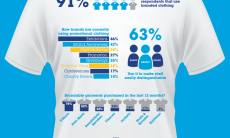We are living in times when our understanding of what is physical or digital as a product or a service gets foggier than ever. Things change, and what really matters is not how good a product is or how efficient a service might be, but how it supplements or enhances what really matters to us; to create value and be part of the value creation process and enjoy the best possible frictionless experience.
Our circumstances are speeding toward a direction we haven’t imagined before.
Until recently, selling was all about how brands create something that might be interesting to the audience out there. Now it is all about how brands can participate in the creation of value out there. Creating value and remaining relevant is critical. Organizations, especially with bigger names, failed to understand the importance of relevancy went out of business, lost market share, or were acquired by another name. We have seen this story repeat over and over during the last 15 years.
Everybody is talking about something related to digital. We all know that some years ago that digital was all about visibility and popularity (such as likes on Facebook and on Twitter). Now digital has evolved into something complicated and demands more from all of us.
The biggest mistake I see brands make is the complacency in their perception: thinking that their competition is what they believe it to be, when in fact their competition is how people see or experience it.
For example, Uber‘s app changes my expectation of FedEx, we compare United Airlines‘ customer service to Amazon‘s, HSBC‘s website with Airbnb‘s, Vodafone services with Buzzfeed.
Your competition may seem small or easy to tackle, but consumers’ expectations are based on who is best across all categories. Brands should stay smart and avoid benchmarking against their target audience and the audience’s needs, such as what might be the best possible experience for their users and customers. Users create value for other users in a constant, seamless way. Value creation happens to address needs and all it needs to flourish is a platform. People nowadays are widely influenced by asymmetrical points of interests, new triggers, content, services, reviews, comments. Smart, innovative platforms allow to brands to deliver value in pace completely unknown in the past.
People change their minds in seconds and always try to find what is more relevant to them, not which brand to follow, because they have been empowered to look for more, to ask for more. People nowadays are not after the best price but after the best value, the most well-designed product, and the product that makes them buy more, and the product that can be used with the least friction.
Friction is something that drives everybody crazy. Recently stats came out in the UK shown that people choose banks not based on the bank size, tradition, or gravitas, but rather based on ratings regarding experience at the app store. This need to look for the best, to discover new services, to question a product or a service when it becomes too complicated, is what makes people explorers.
They want to discover a new way of banking, a new way to communicate, a new way to rent their house, or to drive the car without having to pay premium to insurance companies all the time. That’s why banks like the app-based Monzo thrive, why the car sharing apps work so well, or why new insurance products come out from start-ups. This drives us to understand that the future of engagement will not only be limited to what people see, experience, and obtain.
Companies ignore industry verticals or segmentations to ensure that they control elements that are key to customers’ successful outcomes. Netflix began producing television shows like Orange is the New Black or the House of Cards to ensure a supply of fresh, popular content. Similarly, Amazon’s experimentation with unmanned drones for parcel delivery is an attempt to take control of the last mile between its warehouses and customers.
Relevancy for brands means revenues. How fast and how focused this is delivered ensures that an organization can step up faster towards the direction to learn, adopt, and deliver what people expect better than ever.







